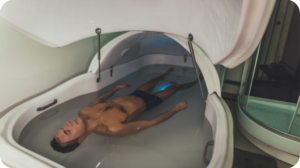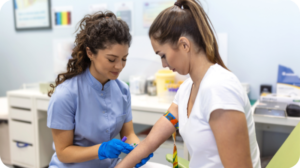New research suggests a simple clinical interview may be a reliable indicator of dementia and Alzheimer’s disease risk. A study by Florida State University College of Medicine researchers found that a two- to three-hour interview, involving trained interviewers asking memory-testing questions and rating responses on a 1-to-5 scale reliably predicted risk for development of Alzheimer’s disease.

This type of interview could eventually be a fast, inexpensive way to determine Alzheimer’s risk, giving future patients a head start on seeking treatment or getting involved with clinical trials.
Announcement of the research comes on the heels of news from the Alzheimer’s Association International Conference that a potential blood-prick test for the disease is in development, and preliminary results show potentially 80 percent effectiveness.
These developments are incredibly relevant given that early detection is key in slowing the progress of Alzheimer’s disease.
Alzheimer’s-Fighting Strategies
Although there is no cure or treatment that can significantly slow or reverse Alzheimer’s disease, there are strategies to combat this horrific, life-destroying illness.
- General health. This is the first and easiest line of defense. Remaining physically active is important, but diet will take on an even bigger role. Avoiding alcohol, eating to manage high blood pressure or blood sugar, and eating a low-calorie, protein-focused diet will also play a part in Alzheimer’s progress. However, perhaps the most powerful lifestyle factor in slowing progression—and perhaps even fighting onset of the disease—is taking steps to regularly get healthy, deep, and restorative sleep.
- Brain challenges. Although they can’t prevent Alzheimer’s, regularly tackling challenging puzzles, or learning a musical instrument or new language, can help “rewire” the brain’s circuits to work around some of the damage done by that amyloid plaques that play a critical role in the development of Alzheimer’s.
- Drugs. The most promising recent drug, lecanemab, was approved by the FDA in July. Research has shown that the drug has the potential to slow disease progression by almost 30 percent. Other drugs have yet to make a significant impact in fighting Alzheimer’s.
The research regarding diagnostic interviews does not include any suggestions as to what age or demographic should receive this approach. However, it could ultimately benefit anyone deemed at genetic risk, and older adults as part of yearly check-ups. If you or someone you know is at risk or suffering from Alzheimer’s, check the Alzheimer’s Association website for up-to-date information on studies, resources, and other important information. If you’re concerned about your risk, consult with your primary caregiver to explore current diagnostic options.





